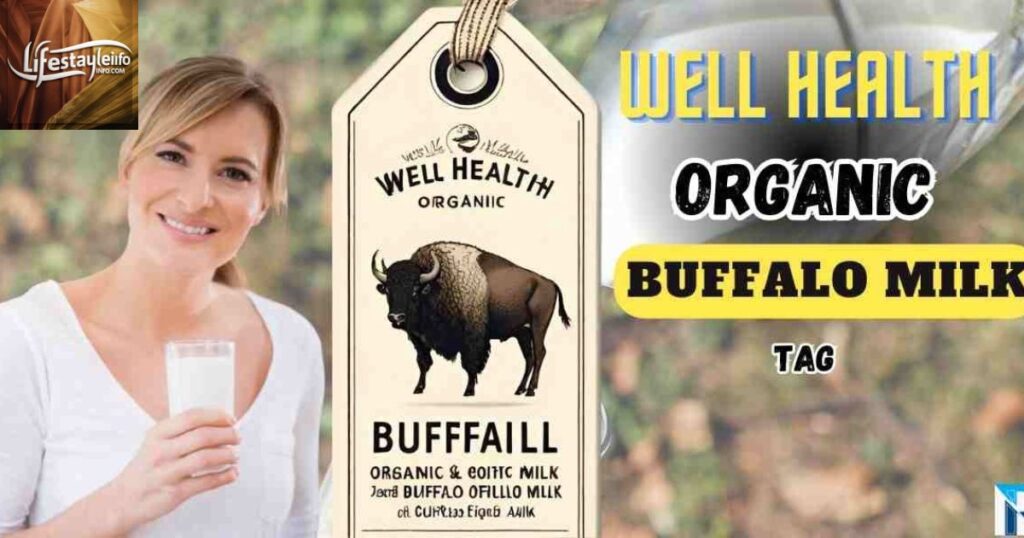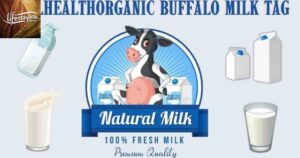Wellhealthorganic buffalo milk is a nutritional powerhouse. It offers unique health benefits compared to cow’s milk. This creamy dairy product is rich in essential nutrients. It boasts higher levels of protein, fat, and minerals. Discovering its benefits can revolutionize your diet and health.
Buffalo milk is gaining popularity for good reasons. It’s easier to digest for many people. The milk contains powerful antioxidants and immune-boosting compounds. Its high calcium content supports strong bones and teeth. Wellhealthorganic buffalo milk stands out for its quality and purity.
This milk variety is not just nutritious but also versatile. It’s excellent for making rich, flavorful dairy products. Buffalo milk can enhance your skincare routine too. It’s a sustainable choice with a lower environmental impact. Exploring wellhealthorganic buffalo milk opens up new health possibilities.
Nutritional Profile of Buffalo Milk
Buffalo milk is renowned for its rich nutritional composition. It contains higher levels of protein, fat, and minerals compared to cow’s milk. This makes it a nutrient-dense food option for various dietary needs.
The milk is particularly high in calcium, phosphorus, and magnesium. These minerals are crucial for bone health and various bodily functions. Buffalo milk also contains significant amounts of vitamins A, B12, and E.
Its unique nutritional profile contributes to its creamy texture and rich taste. This combination of nutrients makes buffalo milk a valuable addition to a balanced diet. It’s especially beneficial for those looking to increase their nutrient intake.
High Protein Content
Buffalo milk stands out for its high protein content. It contains about 10-11% more protein than cow’s milk. This higher protein level makes it an excellent choice for muscle building and repair.
The protein in buffalo milk is easily digestible. It provides all essential amino acids needed by the body. This makes it a complete protein source, beneficial for overall health and growth.
Athletes and fitness enthusiasts often prefer buffalo milk for its protein content. It can help in post-workout recovery and muscle maintenance. The high protein also contributes to a feeling of fullness, aiding in weight management.
Rich in Calcium and Minerals

Buffalo milk is an exceptional source of calcium. It contains about 28% more calcium than cow’s milk. This high calcium content makes it excellent for bone and teeth health.
Besides calcium, it’s rich in other minerals like phosphorus and magnesium. These minerals work together to strengthen bones and prevent osteoporosis. The mineral content also supports various bodily functions, including nerve signaling and muscle contraction.
Regular consumption of buffalo milk can contribute significantly to daily mineral requirements. This is particularly beneficial for growing children, pregnant women, and older adults. The balanced mineral profile supports overall health and well-being.
Higher Fat Content
Buffalo milk is known for its higher fat content compared to cow’s milk. This contributes to its creamy texture and rich flavor. The fat content is about 7-8%, nearly double that of cow’s milk.
While some may be concerned about the higher fat, it’s important to note its quality. Buffalo milk fat contains higher levels of medium-chain fatty acids. These are more easily metabolized by the body and can provide quick energy.
The higher fat content also makes buffalo milk ideal for producing dairy products. It yields more butter and cheese per liter compared to cow’s milk. This fat also helps in the absorption of fat-soluble vitamins present in the milk.
Read More About: Abraham Quiros Villalba: A Visionary in Technological Innovation
Boosts Immune System
Buffalo milk contains higher levels of certain immune-boosting compounds. It’s rich in lactoferrin, a protein with antimicrobial properties. This can help in fighting off harmful bacteria and viruses.
The milk also contains higher levels of antioxidants compared to cow’s milk. These antioxidants help protect cells from damage caused by free radicals. Regular consumption may contribute to a stronger immune system.
Buffalo milk’s nutrient density, including its high vitamin and mineral content, further supports immune function. Its overall nutritional profile makes it a beneficial food for maintaining good health and disease resistance.
Easier to Digest

Many people find buffalo milk easier to digest than cow’s milk. This is partly due to its different protein structure. Buffalo milk contains A2 beta-casein protein, which is easier on the digestive system for some individuals.
The fat globules in buffalo milk are larger but fewer in number. This can make it easier for the body to break down and absorb. Some people with mild lactose intolerance report fewer digestive issues with buffalo milk.
Its easier digestibility makes buffalo milk a good alternative for those with sensitive stomachs. However, individuals with severe dairy allergies should still exercise caution. It’s always best to consult with a healthcare provider before making dietary changes.
Great for Skin Health
Buffalo milk’s nutrient profile makes it beneficial for skin health. Its high fat content helps moisturize and nourish the skin. This can help in maintaining skin elasticity and preventing dryness.
The milk contains vitamins A and E, known for their skin-boosting properties. These vitamins act as antioxidants, protecting skin cells from damage. Buffalo milk is often used in skincare products for its nourishing properties.
Regular consumption or topical application of buffalo milk can promote healthy skin. It may help in reducing signs of aging and improving overall skin texture. However, individual results may vary, and it’s important to use products suitable for your skin type.
Better for Making Dairy Products
Buffalo milk’s composition makes it excellent for dairy product production. Its higher fat and protein content yield more cheese and butter per liter. This makes it economically favorable for dairy producers.
Products made from buffalo milk often have a richer flavor and creamier texture. Mozzarella cheese, traditionally made from buffalo milk, is a prime example. The milk’s properties allow for unique taste profiles in various dairy products.
The higher solid content in buffalo milk also results in thicker yogurt and creamier ice cream. This makes it a preferred choice for many gourmet dairy products. Its unique properties open up new possibilities in dairy product innovation.
Environmental Impact

Buffalo farming generally has a lower environmental impact compared to cattle farming. Buffaloes are more efficient in converting feed into milk. This means they require less feed per liter of milk produced.
They also have a longer productive lifespan compared to dairy cows. This reduces the need for frequent herd replacements. Buffaloes are often raised in more traditional, less intensive farming systems.
However, the environmental impact can vary depending on farming practices. Sustainable buffalo farming can contribute to lower greenhouse gas emissions. It’s important to consider local contexts when assessing environmental impact.
Read More About: Prince Narula Digital PayPal: A Game-Changing Collaboration
Cultural Significance
Buffalo milk holds significant cultural importance in many parts of the world. In countries like India and Pakistan, it’s a staple in traditional diets. It’s used in various culinary preparations and religious ceremonies.
In Italy, buffalo milk is crucial for producing authentic mozzarella di bufala. This cheese is a Protected Designation of Origin product. The cultural significance of buffalo milk extends to traditional medicine in some cultures.
The use of buffalo milk in various cuisines adds to its cultural value. It’s often associated with artisanal and high-quality dairy products. This cultural significance contributes to the preservation of traditional farming practices.
Comparison with Cow’s Milk
Buffalo milk differs from cow’s milk in several aspects. It has higher fat, protein, and mineral content. This makes it more nutrient-dense but also higher in calories.
The taste and texture of buffalo milk are distinct. It’s creamier and has a slightly sweeter taste. The different composition affects how it behaves in cooking and dairy product making.
While both milks are nutritious, buffalo milk may be more suitable for certain needs. It’s often preferred for its richer taste and higher yield in dairy production. However, cow’s milk remains more widely available and familiar to most consumers.
Who Should Consume Buffalo Milk?

Buffalo milk can be beneficial for various groups. Growing children can benefit from its high calcium and protein content. Athletes may appreciate its higher nutrient density for recovery and muscle building.
Pregnant women and older adults might find its rich mineral content helpful. Those with mild lactose intolerance might tolerate buffalo milk better than cow’s milk. However, individual responses can vary.
People looking to gain weight healthily might prefer buffalo milk’s higher calorie content. However, those on calorie-restricted diets should consume it in moderation. As with any dietary change, it’s best to consult a healthcare provider.
How to Incorporate Buffalo Milk into Your Diet
Buffalo milk can be used similarly to cow’s milk in most recipes. It can be consumed as a beverage or used in coffee and tea. Its rich taste makes it excellent for breakfast cereals and smoothies.
In cooking, buffalo milk can enhance the flavor and texture of dishes. It’s great for making creamy sauces, soups, and desserts. Try using it in baking for richer, moister cakes and pastries.
Experiment with buffalo milk in traditional recipes that call for milk. It can add a new dimension to familiar dishes. Start with small amounts to get accustomed to its richer taste and adjust as needed.
Potential Drawbacks
The higher fat content of buffalo milk means it’s also higher in calories. This can be a concern for those watching their calorie intake. It may not be suitable for individuals on very low-fat diets.
Buffalo milk is not as widely available as cow’s milk in many regions. This can make it more expensive and harder to find regularly. The stronger taste might not appeal to everyone, especially those used to cow’s milk.
While easier to digest for some, it’s not suitable for those with severe dairy allergies. The higher nutrient content might not be beneficial for individuals with certain health conditions. Always consult a healthcare provider before making significant dietary changes.
Final Words
Wellhealthorganic buffalo milk offers a unique combination of nutritional benefits, culinary versatility, and potential environmental advantages. Its rich nutrient profile, including higher protein, fat, and mineral content, makes it an attractive option for those seeking to enhance their dietary intake.
While it may not be suitable for everyone due to its higher calorie content and limited availability in some regions, buffalo milk presents an interesting alternative to traditional cow’s milk. As with any dietary change, it’s important to consider individual health needs and consult with healthcare professionals.
FAQ’S
Is buffalo milk healthier than cow’s milk?
Buffalo milk is generally more nutrient-dense, with higher protein, fat, and mineral content. However, both types of milk have their unique benefits, and the choice depends on individual nutritional needs and preferences.
Can people with lactose intolerance drink buffalo milk?
Some people with mild lactose intolerance find buffalo milk easier to digest due to its different protein structure. However, individuals with severe dairy allergies should still exercise caution and consult a healthcare provider.
How does buffalo milk taste compared to cow’s milk?
Buffalo milk has a creamier texture and a slightly sweeter, richer taste than cow’s milk. Its distinct flavor profile makes it popular in certain cuisines and gourmet dairy products.
Is buffalo milk production more environmentally friendly?
Buffalo farming generally has a lower environmental impact due to the animals’ efficient feed conversion and longer productive lifespan. However, the overall impact depends on specific farming practices and local contexts.
How can I incorporate buffalo milk into my diet?
Buffalo milk can be used similarly to cow’s milk in beverages, cooking, and baking. Its rich taste and creamy texture make it excellent for creating flavorful sauces, desserts, and dairy products.

Welcome to LifeStyleInfo.com! We are your go-to source for all things related to enhancing and enriching your daily life. Our mission is to provide you with insightful articles, practical tips, and expert advice across a wide range of topics, including health, wellness, personal finance.









